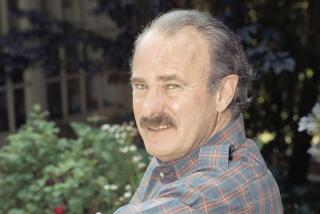BOOK REVIEW : The Myth-Making of a Frontier Celebrity : DANIEL BOONE: The Life and Legend of an American Pioneer <i> by John Mack Faragher</i> ; Henry Holt; $27.50, 429 pages
- Share via
Daniel Boone survived his encounters with rampaging bears, marauding Indian warriors and various other threats and perils of the American frontier, but as we learn in John Mack Faragher’s new biography, there were times when everything he paid for in blood and courage would be stolen by “land Pyrates.”
With candor and good humor, Faragher cheerfully admits that the precise nature of Boone’s heroics will always remain a mystery, for his biography draws heavily on what he calls “folkloric evidence,” including the elaborate cult of the frontier that, in a real sense, began with Boone. As Faragher explains, Boone was a celebrity in his own lifetime, and he is among the earliest and most enduring examples of intentional myth-making in the American popular culture.
“If Boone’s biography required absolute corroboration on all points,” Faragher writes, “it would be thin indeed.”
Significantly, the very first hagiographer of Daniel Boone was a schoolmaster-turned-land speculator named John Filson who owned 12,000 acres of raw Kentucky wilderness: “(Filson) possessed no talent for improving these holdings with an ax or plow,” explains Faragher, “but with his pen he hoped to produce a book that would publicize the country and thereby increase the value of his investment.”
Of course, Daniel Boone’s life amounts to a frontier saga even without the assistance of several generations of publicists, promoters and propagandists.
Born in 1734, Boone was “a sort of pony-built man,” a backwoodsman who kept his hair “plaited and clubbed in Indian fashion,” a lapsed Quaker who was a crack shot and a courageous fighter, an expert hunter and trapper who sought the challenges of the wilderness well into old age, a brave man who inspired courage in others by taking up his rifle during an attack by Indians and ordering his fellows “not to run till they saw him fall.”
Faragher makes good use of the genuine heroics of Daniel Boone, and he gives us real-life scenes that seem straight out of the Saturday matinee: frontier massacres and backwoods guerrilla warfare, narrow escapes and daring rescues. But Faragher does not neglect the work of the academic historian, and he provides a fascinating gloss on the legend and lore of Boone.
For example, Faragher retells the tale of how Boone met his wife, Rebecca--she was looking for stray cattle in the woods, and he nearly shot her while hunting for deer--and then explains how the story, which probably derives from Indian folklore, can be seen “as another example of the close affinities between American and Indian cultures”--and, even more intriguingly, as a hint of “important tensions between frontier men and women.”
Faragher also shows us that Boone was a kind of self-promoter, albeit a hapless and ultimately unsuccessful one. He served as a legislator, a county sheriff, an officer of the militia, a surveyor, all in pursuit of wealth and position, but he was never as adept at real estate speculation as he had been at blazing a trail into the wilderness in the first place.
“A glance at the crazy quilt pattern formed by the property lines of rural Kentucky,” Faragher writes of Boone’s sorry showing as a surveyor, “suggests Boone’s inadequacy to the task at hand.”
Faragher walks a middle path between “the debunkers and the true believers,” but, in the end, “Daniel Boone” is the history of a myth rather than a man. Indeed, Faragher suggests that Boone is “the archetype of the primary American myth, later to be known as the ‘Western,’ which since has appeared countless times in literature, art and film.”
At times, Faragher pulls aside the scrim and shows us the real Daniel Boone. He entertains the possibilities of marital infidelities, he recounts the old controversies about Boone’s dealings with the British and the Indians, he shows us Boone in old age as a weary and frustrated man whose remarkable efforts in service of America’s manifest destiny were never properly rewarded.
“I am very sorry to say that I ever killed any (Indians),” the aging Boone said, “for they have always been kinder to me than the whites.”
But Faragher allows us to understand that the old backwoodsman thoroughly enjoyed his own celebrity. And, in that sense, “Daniel Boone” shows us a familiar and strikingly modern figure: the celebrity who acts in complicity with those who celebrate him, the man who allows himself to be regarded as something mythic--and revels in it.
“All true! Every word true!” is what Boone said of the book that first made him famous. “Not a lie in it!”
More to Read
Sign up for our Book Club newsletter
Get the latest news, events and more from the Los Angeles Times Book Club, and help us get L.A. reading and talking.
You may occasionally receive promotional content from the Los Angeles Times.










